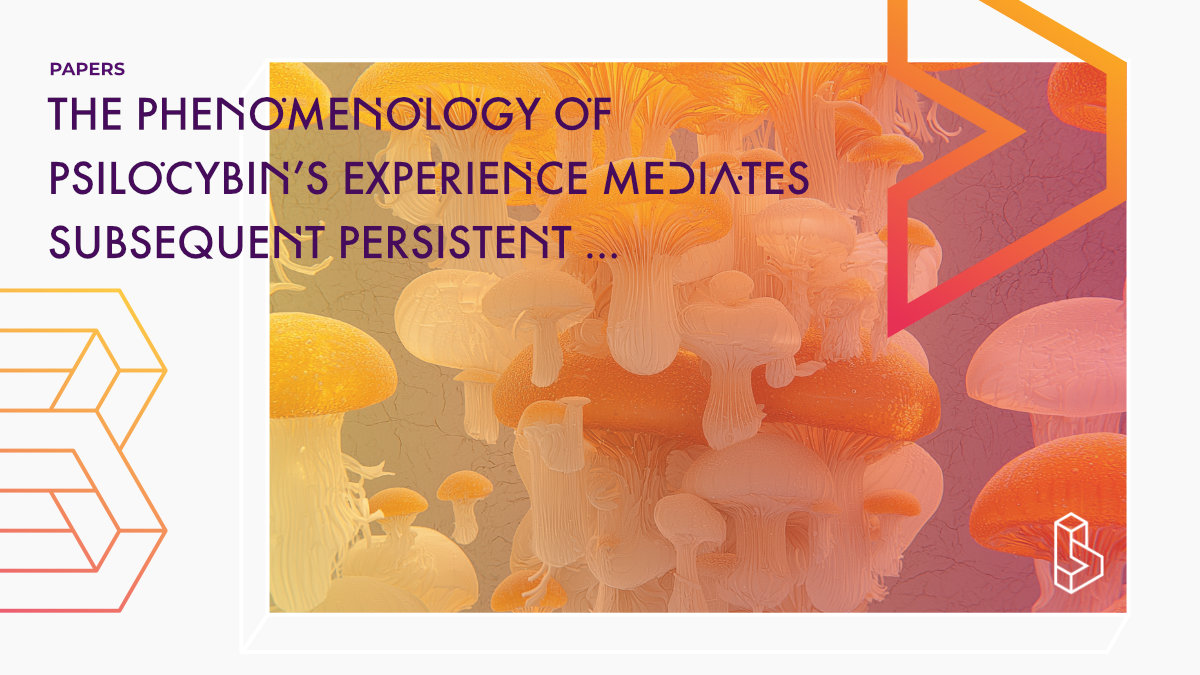This double-blind, placebo-controlled, cross-over study (n=40) found that two doses of psilocybin (18.2mg/70kg) administered at least 56 days apart (avg. 15 months) produced positive lasting effects in healthy individuals regardless of previous psychedelic experience, sex, or setting, with challenging experiences in controlled environments not causing adverse outcomes, supporting psilocybin’s psychological safety for repeated use.
Abstract of The phenomenology of psilocybin’s experience mediates subsequent persistent psychological effects independently of sex, previous experience, or setting
“Background: Recent studies intensively explore psilocybin’s antidepressant potential, but variables like previous experience, repeated use, setting, and sex remain underexplored. This study examines acute and long-term effects of psilocybin in healthy individuals.
Methods: A double-blind, placebo-controlled, cross-over study included 40 healthy participants (20 females, mean age 38). Each received two doses of psilocybin (0.26 mg/kg) at least 56 days apart (mean 488) in two neuroimaging study arms. Nearly half had previous psychedelic experience. Acute effects were measured using the Altered States of Consciousness Scales (ASCs) and a Visual Analogue Scale (VAS) for emotional valence. The Persisting Effects Questionnaire (PEQ) assessed long-term effects.
Results: All results were independent of observed variables such as previous psychedelic experience, repeated use, setting, sex and occupation. Acute effects were moderate on the ASCs, with VAS ratings showing mostly pleasant or fluctuating experiences and only one unpleasant session. All experiences resolved in a positive or neutral state by the session’s end. Psilocybin produced lasting positive effects across all PEQ domains, with negligible negative effects. Oceanic Boundlessness (OBN) and Visionary Restructuralization (VRS) correlated with positive outcomes, while Dread of Ego Dissolution (DED), typically associated with fear, did not predict negative effects. The nature of the acute experience (pleasant or mixed) was not linked to the direction or intensity of long-term outcomes. Peak experiences ending in a positive mood were strongly associated with favourable long-term effects.
Conclusion: Repeated psilocybin administration in healthy individuals induces positive, lasting effects, with challenging experiences in controlled settings not causing adverse outcomes. These findings support psilocybin’s psychological safety and its repeated use in clinical trials.“
Authors: Tereza Klučková, Marek Nikolič, Filip Tylš, Vojtěch Viktorin, Čestmír Vejmola, Michaela Viktorinová, Anna Bravermanová, Renáta Androvičová, Veronika Andrashko, Jakub Korčák, Peter Zach, Kateřina Hájková, Martin Kuchař, Marie Balíková, Martin Brunovský, Jiří Horáček & Tomáš Páleníček
Summary of The phenomenology of psilocybin’s experience mediates subsequent persistent psychological effects independently of sex, previous experience, or setting
Psilocybin, a naturally occurring psychedelic compound belonging to the tryptamine class, has gained increasing attention for its rapid antidepressant properties. Unlike traditional antidepressants, which can take weeks to become effective, psilocybin has been observed to produce almost immediate improvements in mood. These effects are comparable to other rapid-onset agents like ketamine, a dissociative NMDA receptor antagonist already used in clinical contexts. The acute psychological effects of psilocybin—often described as mystical, peak, or enlightening experiences—are thought to play a significant role in its long-term therapeutic benefits. However, the exact relationship between the nature of the psychedelic experience and these long-lasting effects remains under investigation.
Researchers have noted that subjective effects such as ego dissolution and emotional openness may contribute to the antidepressant potential of psychedelics. Ego dissolution, for example, may involve a temporary loss of the sense of self, often perceived positively when it results in feelings of unity and transcendence. Key tools for assessing these states include the Altered States of Consciousness Scales (ASCs), the Mystical Experience Questionnaire (MEQ), and Visual Analogue Scales (VAS). Some studies suggest that these experiential aspects are essential for therapeutic success, while others—particularly research into ketamine and esketamine—argue that pharmacological effects alone may suffice.
Find this paper
https://doi.org/10.1007/s43440-025-00742-5
Open Access | Google Scholar | Backup | 🕊
Cite this paper (APA)
Klučková, T., Nikolič, M., Tylš, F., Viktorin, V., Vejmola, Č., Viktorinová, M., ... & Páleníček, T. (2025). The phenomenology of psilocybin’s experience mediates subsequent persistent psychological effects independently of sex, previous experience, or setting. Pharmacological Reports, 1-16.
Study details
Compounds studied
Psilocybin
Placebo
Topics studied
Healthy Subjects
Neuroscience
Study characteristics
Original
Placebo-Controlled
Double-Blind
Within-Subject
Randomized
Bio/Neuro
Participants
40
Humans
Compound Details
The psychedelics given at which dose and how many times
Psilocybin 18.2 mg | 2xLinked Clinical Trial
Animal and human serotonergic model of schizophrenia: validity evaluated by qEEG and fMRIThis trial (n=20) investigates the effects of psilocybin (18.2mg/70kg) on several brain measures and sleep quality.

